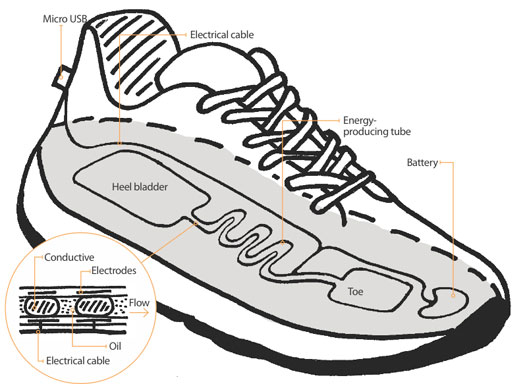

Humans are not very efficient. When we walk, we waste close to 20 watts of energy per second. Instead of turning all calories into lift or forward motion, we turn most of them into heat that’s quickly dissipated. So my colleagues and I came up with a way to harvest the wasted energy from human motion and convert it into about 10 watts of electricity.
Our device is based on a physical phenomenon called electrowetting: If you apply electrical voltage to certain liquids, the liquid moves. This means you have converted electrical energy (the current) to mechanical energy (the liquid in motion). We reversed the process, forcing liquid to move over electrodes. In the shoe, you have two flexible plastic bladders, one under the heel and the other under the toe. The bladders are filled with a mixture of oil and water and connected by a thin, snaking tube. When you step down on your heel, you compress the rear bladder, and several milliliters of liquid travel through the tube to the front bladder. Step on the toe, and the process is reversed.
The tube is lined with a thin film of electrodes, and as the liquid slides back and forth, the electrodes charge—electrowetting in reverse. A small battery stores the energy, and you can access that energy by way of a micro-USB port on the heel of the shoe. We also invented a way, like Wi-Fi, to transfer power from shoe to cellphone battery. Military or police might like having a regular supply of power, but I suspect most people wouldn’t be happy dealing with wires connected to their footwear.